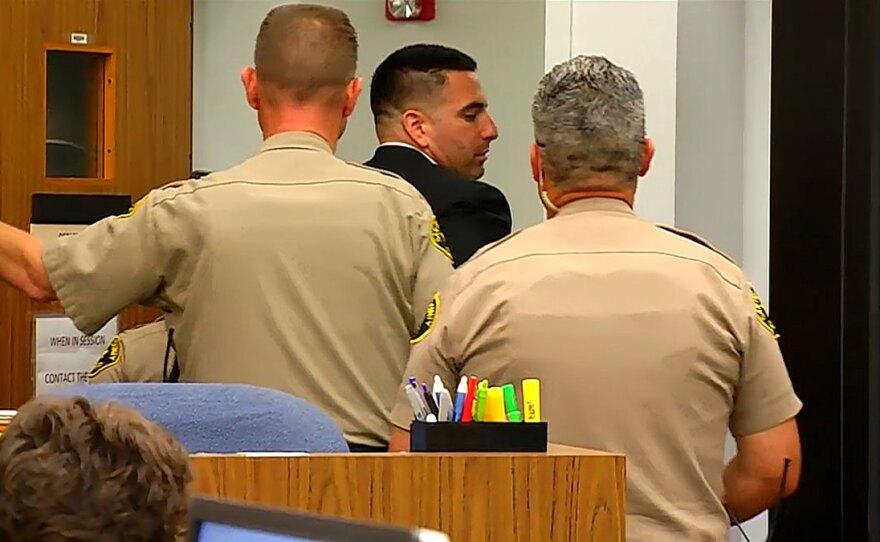After an almost yearlong battle, the San Diego County Sheriff's Department released data to KPBS about how long it took to respond to citizens' complaints about its officers.
KPBS filed a lawsuit for the records after multiple women said they reported a Sheriff's deputy for sexual misconduct but never received a response or received a delayed response.
The records release came as part of a settlement between KPBS and San Diego County over access to the records. Last week, the Sheriff's Department agreed to provide all of the complaint data between 2014 and 2018. The department does not keep records for longer than five years, so no earlier data was available.
Complaints with no answer
The data shows that more than one in six complaints made to the Sheriff's Department never got a response of any kind. That's out of a total of 425 complaints received between 2014 and 2018.
There are several reasons complaints may not have received a response, said Robert Faigin, the chief attorney for the Sheriff's Department.
For example, he said, someone might write to complain "there are Martians landing on my front lawn," or "the government is out to get me," and those complaints would not receive a response.
Other reasons include numerous or repetitive complaints from the same person after the issue was previously addressed, the sender was anonymous, had no fixed address, or provided no contact information.
However, there are other possible complaints that did not receive responses, including one example of an alleged assault report. Last year a woman identified in court documents by her initials K.P. said she wrote two letters to the Sheriff's Department complaining that Sheriff's Deputy Richard Fischer groped her during a traffic stop. No one ever responded.
The Sheriff's Department said it never received the letters. Neither of those letters appeared to be logged in the data provided to KPBS.
Asked why those letters do not appear in the records, Faigin said, "there is a simple explanation, and sometimes the simplest answer is the correct answer, which is that she didn't send them to us." He also said they could have gotten lost in the mail.
Length of time to respond
Of the complaints that did get a response, 42 people had to wait more than a month and the average response time was 13 days.
KPBS made the same request of the San Diego Police Department. Its records showed the police department took on average about the same number of days to respond to complaints about its officers.
The legal battle
After the Sheriff's Department denied initial records requests in June and July 2018, KPBS worked with lawyers from the Sheppard Mullin law firm to attempt to negotiate for the records.
The negotiations included an offer to allow the Sheriff's Department to only provide a sample of the complaint data, but the department still refused. So in January, KPBS sued for the records and last week reached a settlement.
"After that lawsuit was filed, San Diego County indicated that it might be willing to provide the requested information if we settled the case, so we communicated with the County Counsel’s office and we were able to reach an agreement," said James Chadwick, one of the Sheppard Mullin attorneys who represented KPBS.
The Sheriff's Department will also pay attorney's fees to Sheppard Mullin, about $18,000. Chadwick said that paying attorney's fees is standard practice under the California Public Records Act.
"The Legislature has recognized that the burden of pursuing a lawsuit against a government agency can be very substantial, that most people, and many organizations, such as KPBS, simply can’t afford to pursue such lawsuits," he said. "An award of fees makes it possible for people to find attorneys who will ultimately recover fees and get paid if they pursue a lawsuit that has merit."
Chadwick said his firm would not have been able to take on the case if there was no prospect of recovering attorney's fees. He added that if the Sheriff's Department had wanted to avoid spending the money, it could have provided the records when first asked.
"Along with KPBS, we worked very hard to persuade the department to provide this information before we filed the lawsuit," Chadwick said. "The department could have avoided any costs by simply agreeing to turn over the information it is now providing instead of forcing KPBS to file a lawsuit."
Timeline of KPBS Requests
June 22, 2018: KPBS sent a request to the Sheriff's Department for the dates all complaints were filed about its employees from 2011 to 2018, and the dates the Sheriff's Department responded to each complaint.
July 2, 2018: The Sheriff's Department denied the request.
July 5, 2018: Lawyers working for KPBS sent a letter to the Sheriff's Department disputing the reasons for the denial and asking the department to reconsider.
July 16, 2018: The Sheriff's Department again denied the request.
Oct. 5, 2018: After working with the San Diego Police Department to secure the same records requested of the San Diego Sheriff's Department, lawyers working for KPBS sent a letter to the Sheriff's Department offering to work with them to help them comply with the request.
Oct. 22, 2018: The Sheriff's Department again denied the request.
Jan. 22, 2019: KPBS sued the Sheriff's Department for the records.
May 29, 2019: KPBS and the Sheriff's Department settled the case and the Sheriff's Department provides the records.
Why KPBS wanted the records
KPBS asked for the records after multiple women accused Deputy Richard Fischer of sexual misconduct and said they reported the conduct to the Sheriff's Department but never received a response, or waited months for a response.
RELATED: Six Women Accuse San Diego Sheriff’s Deputy Of Sexual Misconduct
That includes K.P., who said after Fischer groped her during a traffic stop, she sent two letters to the Sheriff's Department in March 2016 and November 2017, but no one ever responded. More than a year later, the Sheriff's Department reached out to K.P. after another woman filed a lawsuit over Fischer's behavior, according to court documents.
Fischer is now facing criminal charges for multiple sexual assaults, with a trial scheduled to begin in September. To date, 21 women have filed civil lawsuits against Fischer and the Sheriff's Department, said James Mitchell, a lawyer representing many of the women. Five cases have been settled, and all but one are on hold until Fischer's criminal trial is complete.

How the Sheriff handles complaints
Under a new California law aimed at boosting transparency in all law enforcement agencies, the Sheriff's Department is releasing internal records about cases involving its deputies who were investigated for killing someone, badly injuring them, sexually assaulting someone, or lying during an investigation.
Although these records do not directly address the time it takes to respond to complaints, they do give some picture as to what happens when the department receives a complaint.
RELATED: San Diego Sheriff Releases Reports About Deputies Accused Of Sexual Assault
In one case, Deputy Timothy Wilson Jr. groped a teenage girl while standing behind her at a Vista Panda Express restaurant. The incident was captured on a security camera, and as soon as Sheriff's Department investigators determined Wilson was the man in the video, he was arrested and removed from his position at the department. He resigned from the department and then pleaded guilty to the crime and was sentenced to a year in prison.
In another case, Deputy Juan Andrade allegedly groped a homeless woman after she reported she was the victim of a sexual assault. The incident happened on March 11, 2017, and an investigator was assigned the complaint just over two weeks later. Andrade was interviewed in early May, and he resigned in August after an internal investigation into his behavior.
The department has not yet released all of its records, so later reports could show different responses to complaints.
Dave Myers, a 35-year veteran of the department, told KPBS the Sheriff's Department does not have a consistent system for handling complaints. Myers retired last summer after unsuccessfully challenging Sheriff Bill Gore in the June 2018 election.
He said the policy is to "handle that complaint at the lowest level possible," which means a clerk working the counter at a station could talk to someone from the public, and if that person "appears to be or says that they're satisfied, then the complaint at that point is closed."
"There's no other documentation, there are no other discussions," he said. "There may be a follow-up email, maybe to an immediate supervisor, and that would be the end of it."
Myers said the way the process is currently set up is "ripe for abuse."
"If the public cannot trust law enforcement to police itself in a fair manner that's transparent, then how are they going to trust that the process is working?" he said.
Faigin, the Sheriff Department's chief attorney, said the department keeps a computer entry with a complaint number and the date and time a complaint was received. But, he said, in the past the department did not log when the complaint received a response. Instead, that information was only kept "in the hard copy written notification stored in each individual file," he said.
In 2017, the department switched to a new computer system and began logging response dates in the same database, he said.








